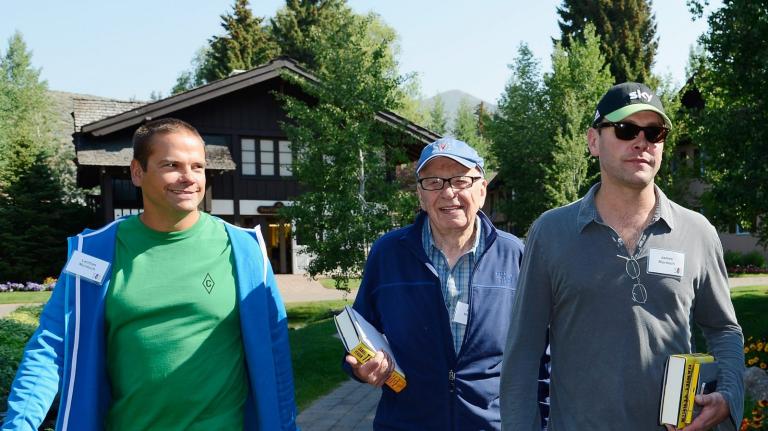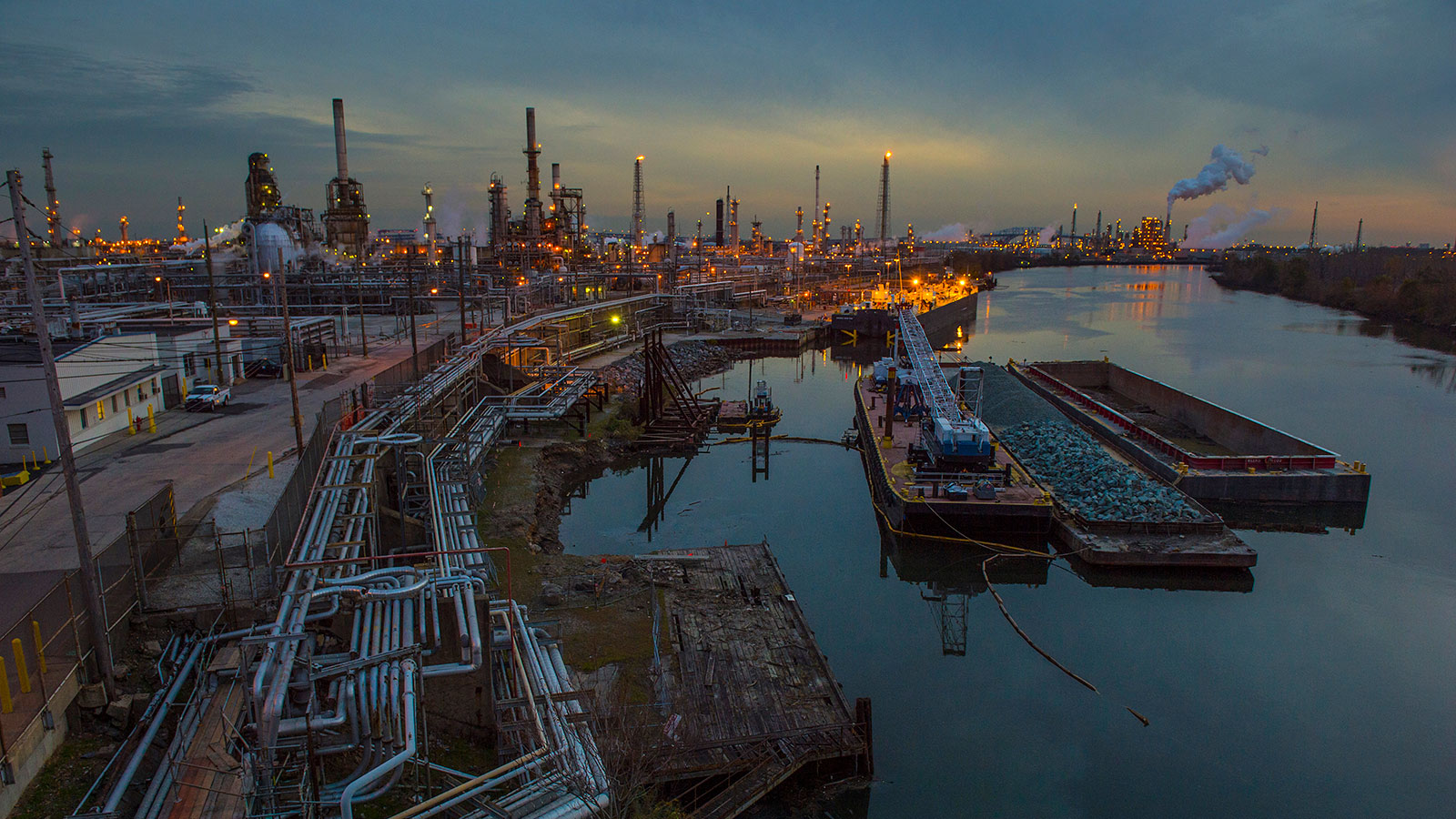On Friday, an auction held in the New York City offices of the law firm Kirkland & Ellis LLP, will determine the future of 1,300 acres in South Philadelphia and signal what lies ahead for shuttered oil and gas facilities all over the country. For more than 150 years, the land has hosted the largest refinery on the East Coast, processing up to 335,000 barrels of crude oil per day into gasoline and home heating oil. But after an explosion and fire tore through the facility last summer, Philadelphia Energy Solutions, the company that owned it, filed for bankruptcy and put the massive lot up for sale.
The stakes of the sale are high. With the closure of the refinery, Philadelphia lost almost 2,000 jobs, many of them union jobs, and an estimated $33 million in tax revenue. The land is located along the Schuylkill River, just a few miles from downtown Philly, and measures roughly the same size as the city center. If it weren’t burdened with 150 years of contamination, it would be prime real estate for a waterfront park, housing, or a mixed-use development.
A public health nightmare
Philadelphia’s air, water, and public health are also on the table. According to a city report on the refinery, it was “the largest single emitter of toxic pollutants in Philadelphia,” and estimated to be responsible for 20 percent of the city’s greenhouse gas emissions, which does not include emissions from when the refinery’s products were burned in cars and homes. It also regularly violated the Clean Air Act and the Clean Water Acts, according to EPA records, and a recent NBC News investigation found that its air monitors recorded leaks of benzene, a cancer-causing gas, that were over the federal limit for weeks at a time.
While it’s difficult to link any particular health condition directly to the refinery, its emissions contained known carcinogens and respiratory irritants. Philadelphia County has a high rate of cancer incidence and death compared to the rest of the state, and the city continually ranks among the top 10 most challenging cities to live in for asthma by the Asthma and Allergy Foundation of America.
“They’ve been polluting the air for years,” said Rodney Ray, who lives in Grays Ferry just north of the refinery. “I live right around the corner from the refinery and I also worked there, but now I’m retired. My breathing’s not that good, my health is not that good today.” Ray told Grist that he wants to see solar panels and windmills on the site, and hopes some of the new jobs go to his neighbors in the community.
Residents, workers wait in the dark
Ray is a member of Philly Thrive, a grassroots environmental justice group that has been organizing community members that live near the refinery and raising awareness about its public health costs since 2015. During a series of meetings hosted by the city after the fire, the group lobbied the city to close the site to fossil fuels forever and devote the land to a more sustainable use. Now, the sale process is happening behind closed doors in New York City, and the community hasn’t been informed of who their potential new neighbors could be — the bidders have not been disclosed. On Friday, Philly Thrive will be protesting outside the building where the auction is taking place since they won’t be allowed inside.
But those hoping for a greener future for the site have clashed with the local chapter of the United Steelworkers Union, which had more than 600 members employed at the refinery and is fighting to get those jobs back. “We want someone who’s committed to running the refinery as a refinery, and hire everyone back there who was laid off,” Ryan O’Callaghan, the president of USW Local 10-1, told Grist.
The potential buyers
Fifteen potential buyers submitted formal letters of interest when the auction process began in November. But not all of the interested parties were expected to stick it out, and it’s unclear how many will be present at the auction — the final number of bidders has not been disclosed.
Neither have their identities, although three publicly confirmed their interest last fall. One is “Fossil Phil” Rinaldi, the former chief executive of Philadelphia Energy Solutions, who’s coming out of retirement to try to win it back. Rinaldi announced in August that he was forming a new company called Philadelphia Energy Industries in order to buy the refinery and restart it with a heavier focus on chemical production.
The restart under Rinaldi would also include some slightly more sustainable uses. His company has entered into a mutual cooperation agreement with RNG Energy Solutions, a company that proposed leasing part of the PES site to build a biogas plant there in 2018. The agreement would have RNG building a 10-megawatt solar farm on the site in addition to a facility that would produce natural gas from food waste and “renewable” diesel fuel from fats, oils, and greases.
“We think that this is a good transition project that combines both the refinery operations and a sustainable renewable solution,” James Potter, president of RNG Energy, told WHYY last fall.
The second known bidder is S.G. Preston, a Philadelphia-based company that says it would use the refinery to produce renewable diesel, marine diesel, and jet fuel for airplanes. Similar to RNG’s proposed facility, it would recycle waste fats, oils, and greases from the community into fuel. However, a Real News Network investigation found that the company has never actually opened a biofuels facility before.
Industrial Realty Group, a real estate development and investment firm, also expressed an interest in the site, although the firm’s plan for it was not disclosed. The company has a history of retrofitting industrial sites into business parks and other commercial uses.
Does the city have a say?
In August, two months after the explosion, the city of Philadelphia created a Refinery Advisory Group made up of various stakeholders, including city staff, community members, and labor leaders. The purpose of the group was to gather “information about the refinery site and its possible future use.” The group held six public meetings, allowing the city to gather input from hundreds of residents who were given a forum to express their feelings about the refinery’s closure.
From the beginning, the city insisted that its influence over the future of the site was limited.
However, in November, the bankruptcy court judge presiding over the refinery’s Chapter 11 filing granted the city the right to learn the identity of the bidders and attend the auction. Mike Dunn, a spokesperson for the Philadelphia mayor’s office, told Grist that attorneys with the city’s Law Department and representatives from the Managing Director’s Office will attend the auction. He said the city representatives expect to be included in the discussion and have the opportunity to raise any objections, concerns, or support for the winning bid.
When asked if the city had a preferred buyer, Dunn cited the city’s report summarizing the findings of the Refinery Advisory Group, which presents a set of guiding values for how the city should evaluate proposals. “It is our hope that a future will emerge for the site that puts the public’s safety as a top priority, has a more positive impact on the environment, engages meaningfully with the surrounding communities, and contributes significantly to the region’s economy,” he said.
Dunn added that regardless of the new owner or future use, the city planned to strengthen regulations of hydrofluoric acid, a toxic chemical used in the refinery that could have killed thousands of Philadelphians had it leaked into the air, and to evaluate the city’s air monitoring system.
But ultimately, the future of the site is up to PES, its creditors, and the Delaware bankruptcy court overseeing the proceedings.




